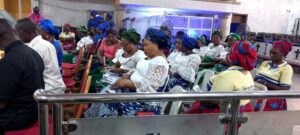HEDA Reviews Marginal Field Bids Licencing, Unveils Special Publication

By Obiajulu Uwadone Nio.
The Human Environmental Development Agenda , HEDA , spot lights the Marginal Field Oil sub sector.
Marginal Oil Field is any discovery of Oil Field , that has been left unattended for a period of not less than ten years , effective from the date of discovery of such oil field.
In the 1970’s, oil policies in Nigeria focused on two policies ,which was The Indigenization Policy of Government,aimed at Promoting and Protecting Indigenous Capital to counter balance multinational dominance of Nigeria’s economy.
In history, Nigeria has only had two successful Marginal Field Bid Licensing rounds, 2003/2004 and the 2020/2021.
The 2020/2021 exercise passed the Quality Assessment test at a critical time in Nigeria’s oil industry history.repleted with mixed results.
Among them were : Declining joint ventures,growing insecurity as a result of oil theft, High cost of Production and other.
Some of the challenges were : Decline in gas for power supply, job creation, project fund constraints. The above challenges stifled investment and production output ,this in turn affected the growth and development of of the Oil and Gas industry in Nigeria.



Another challenge was that, the study relied on both primary and secondary data sources , leveraging long time relationship between the researchers and oil and stakeholders across public and private sectors as well as published materials.
Published materials came in form of legal records, guidelines of past bid licensing process,reports and analysis of global trends in oil license bids and awards, as well as various media reports and analysis of the 2020/2021 exercise in Nigeria.
This Bid Licensing recorded anticipated milestone. It expanded the space of indigenous participation in the oil and gas industry, raising potentials for growing proven reserves, this fetched federal government two hundred billion naira and Seven million US Dollars.
It changed the narrative of perennial scandals about derailment from due process, corruption and conflict interest.
This exercise opened the door for many downstream sector companies an opportunity to make significant inroad into upstream petroleum development sector. Among them are : A A Rano, Ardova Plc ,Genesis, Matrix Energy, MRS ,NIPCO and Shafa.
Background and Methodology check by HEDA. This output is an advocacy document, alerting ,relevant authorities on the risk posed to due diligence and good business behavior, with a view to ensuring that beneficiaries of bad behaviours are exposed and tamed to sanitize the petroleum sector.
Despite the observed delays, Nigeria’s 2020/2021 Marginal Field Bid Licensing was largely a success , it however recommends authorities to look out for the following in the future.
Watch out to mitigate real or imagined allegations about happenings practices across stakeholders especially those who felt left out.
Respect basic rights of investors and companies and do not force mergers of companies and persons.
Broader stakeholders’ buy in and respect for independent investor companies to determine mergers and formation and profit sharing formula should be guaranteed , rather than force mergers of strange bedfellows.
In an interview with the chairman ,HEDA Resource center, Olanrewaju Suraju , says Nigeria has hardly benefitted from some of the resources and investment , an example is the Malabu case , where oil blocks was allocated to people who were either ministers or children of the late military president General Sanni Abacha, valued at Six point Eight billion US Dollars, to companies that were incorporated few days before it was allocated its license, from this venture, Nigeria got only two hundred and fifty billion dollars.
These are companies without oil exploration experience. The idea then was to bring in indigenous companies to be part take in oil extraction sector , for Nigeria to move away from the dominance of major corporation outside the country .
Unfortunately, it was mismanaged to the benefit of selected few.
In a worried state, Olanrewaju mentioned that corruption in the Nigerian oil and gas sector is the worst in the world.,the corruption spreads across indigenous and foreign banks . But looks forward to a change in the dynamics of Nigeria and a paradigm shift .
In tackling change, there must be public participation,where communities are given allocation, with media given free hand to monitor and ensure that license awardees complies with layed down regulations and generate resources. And these resources are evenly distributed.






